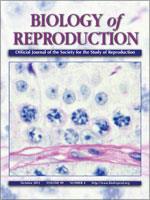Transforming growth factor-beta (TGF-B) plays an important role in embryo implantation; however, TGF-B requires liberation from its inactive latent forms (i.e., large latent TGF-B complex [LLC] and small latent TGF-B complex [SLC]) to its biologically active (i.e., monomer or dimer) forms in order to act on its receptors (TGF-BRs), which in turn activate SMAD2/3. Activation of TGF-B1 from its latent complexes in the uterus is not yet deciphered. We investigated uterine latent TGF-B1 complex and its biologically active form during implantation, decidualization, and delayed implantation. Our study, utilizing nonreducing SDS-PAGE followed by Western blotting and immunoblotting with TGF-B1, LTBP1, and latency-associated peptide, showed the presence of LLC and SLC in the uterine extracellular matrix and plasma membranous protein fraction during stages of the implantation period. A biologically active form of TGF-B1 (∼17-kDa monomer) was highly elevated in the uterine plasma membranous compartment at the peri-implantation stage (implantation and nonimplantation sites). Administration of hydroxychloroquine (an inhibitor of pro-TGF-B processing) at the preimplantation stage was able to block the liberation of biologically active TGF-B1 from its latent complex at the postimplantation stage; as a consequence, the number of implantation sites was reduced at Day 5 (1000 h), as was the number of fetuses at Day 13. The inhibition of TGF-B1 showed reduced levels of phosphorylated SMAD3. Further, the delayed-implantation mouse model showed progesterone and estradiol coordination to release the active TGF-B1 form from its latent complex in the receptive endometrium. This study demonstrates the importance of liberation of biologically active TGF-B1 during the implantation period and its regulation by estradiol.
How to translate text using browser tools
7 August 2013
Transforming Growth Factor-Beta 1 (TGF-B1) Liberation from Its Latent Complex During Embryo Implantation and Its Regulation by Estradiol in Mouse
Vineet Kumar Maurya,
Rajesh Kumar Jha,
Vijay Kumar,
Anubha Joshi,
Sangappa Chadchan,
Jasna Jagan Mohan,
Malini Laloraya
ACCESS THE FULL ARTICLE

Biology of Reproduction
Vol. 89 • No. 4
October 2013
Vol. 89 • No. 4
October 2013
decidualization
delayed implantation
embryo implantation
latent TGF-B1 complex
ovarian steroids
TGF-B1 activation




